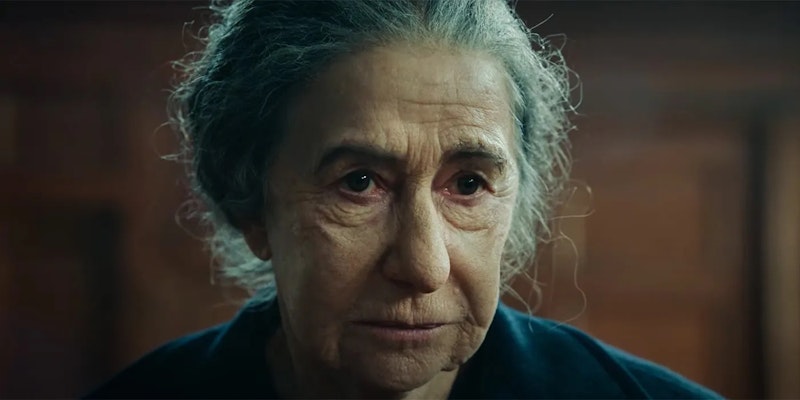The discourse around Golda, the new film in which Helen Mirren plays 1970s Israeli Prime Minister Golda Meir, has been overwhelmed by the controversy about "Jewface," the term used when non-Jewish performers like Mirren are cast as Jewish characters. Thanks to the trailer for Bradley Cooper's Leonard Bernstein movie, Golda isn't the most prominent Jewface controversy of its release week.
While I see both sides of the argument, I tend to err on the side of believing that acting is acting and that there shouldn't be a religious test on movie casting decisions. I don't think an actress of Mirren's stature should have to shy away from playing a part due to being of the wrong religion or nationality. That said, this is one of those roles in which the performer is wearing so much makeup and prosthetics that it gets in the way of the acting. This was less of an issue for past Goldas like Lynn Cohen (who played the part, briefly but memorably, in Steven Spielberg's Munich) and Tovah Feldshuh (who performed as Meir in the one-woman show Golda's Balcony, later shot for a film).
Golda Meir was Israel's first (and only) woman prime minister, she was 75 at the time of the film's events and also stricken with cancer. Mirren, who at 78 is older than the prime minister was at the time, nails the voice and holds the camera, although the prosthetics often get in the way of facial expressions.
Golda’s a watchable treatment of Meir's role during the October 1973 Yom Kippur War, when Israel was nearly overrun by Egypt and Syria before they turned the tide and fought to a stalemate. The war was a major Cold War skirmish, with the Americans and Soviets re-supplying the two sides, and led in the years afterward to the oil embargo. Those who are Israel history buffs will enjoy it.
The film uses a similar structure to Oppenheimer, in which the narrative cuts between different periods, including an interrogation taking place years after the main events. In both, about 95 of the action is people sitting in rooms talking. This isn't, however, nearly the cinematic achievement that Christopher Nolan's film was. Just as Oppenheimer featured a virtual who's-who of well-known American actors, Golda casts Israeli acting stalwarts as the top generals and ministers. Rami Heuberger is Moshe Dayan, Lior Ashkenazi is IDF chief David Elazar, and Ohad Knoller is Ariel Sharon. There’s also an American ringer, Liev Schreiber, who plays Henry Kissinger as probably the most convincing on-screen Kissinger since Paul Sorvino in Oliver Stone’s Nixon.
Golda appears to mostly stick with the historical record, with one exception: We see Kissinger woken up and told that he must deal with the crisis. And he's alone, contrary to his well-known proclivities with the ladies. But in fact, there's a whole paragraph in Garrett Graff's great Watergate: A History about how Richard Nixon, in the middle of Kissinger's meeting with lawmakers to brief them on the Yom Kippur War, kept interrupting to say that Kissinger, when the call came, was "in bed with a broad" and that "it's a terrible thing when you're with a girl and the Secret Service comes looking for you."
Beyond the cast, this is an extremely international production: It's set in Israel but shot in London, by the Israeli-American director Guy Nattiv, who won an Oscar in 2018 for the very disquieting short film Skin.
Between the Jewface flap and being a movie that takes Zionism at face value, Golda was sure to be controversial, and kick off spirited debates, especially among Jewish people. And the movie, just as its trailer did, uses Leonard Cohen's "Who By Fire"—a song whose lyrics come from the Yom Kippur liturgy—for a film about the Yom Kippur War. A fine Unetanneh Tokef in-joke for the Jewish people in the audience.

